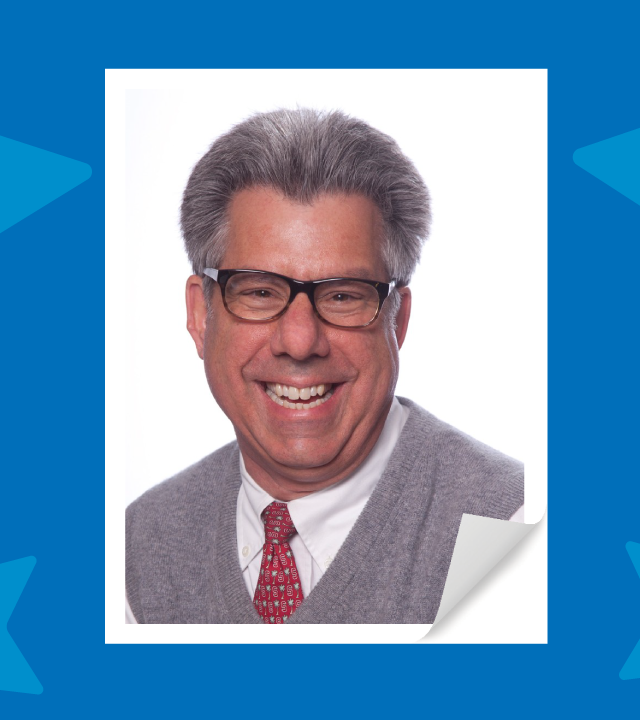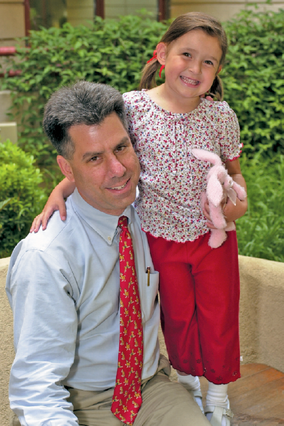
Healing with grace, style, and hope
When Janine Reid’s son Mason was diagnosed with a brain tumor in 2007, they initially struggled to find a neuro-oncologist.
“We were completely devastated. We had met a few doctors and it wasn't a match,” she recalls. Then the family met Dr. Paul Fisher, chief of the Division of Child Neurology for the Lucile Packard Children’s Hospital at Stanford University and founder of Stanford’s pediatric brain tumor program.
“From the moment we sat down with Dr. Fisher, he looked Mason in the eye and he just started a rapport with my son,” Reid says. “Immediately, his eyes were on Mason and he saw Mason as more than an MRI scan. Dr. Fisher sees each kid in their unique, wonderful kid-ness.”
Dr. Fisher believes that medicine should not just cure but also heal. “Part of healing is making the child and family whole,” he says. “As in sports, even if you are not going to win the game, you want to play it out with grace and style. For me it's really important that, even if it is clear our team may not cure as many kids as we want or hope, we can still do it with grace and leave it in a situation where there is some good feeling along the way.”
This philosophy is a big reason why Dr. Fisher has been referring children to Make-A-Wish for more than 25 years. He first heard of Make-A-Wish as he was starting his medical career at Johns Hopkins Hospital and connected with the Make-A-Wish Mid-Atlantic chapter.
“As I was doing lots of face to face time with patients, I saw the adversity, the challenges, and the downs in what they were going through, and in many ways it became clear to me that this was an incredible opportunity for kids and for the families,” he said.
That’s why Dr. Fisher referred Mason for a wish. Mason's mom didn’t know a lot about Make-A-Wish at that point, but she relied on Dr. Fisher’s advice.
“We just really trust him and believe in him,” she says. “And, when the wish came, you know, he knew better than we did that we needed that wish. I didn't even know what the wish would mean to us.”
Reid says that Mason’s coping skill is humor, and that’s why he used his wish to see Stephen Colbert’s show live. His wish came true in 2009, and he is now 22—Dr. Fisher has been his neuro-oncologist for more than 10 years.
“We worked with Dr. Fisher and we focused in on those cells of that tumor and the very precise science of it,” Reid recalls of her son’s treatment journey. “And then he helped us shift that focus with the wish, to all the great things in the world. You know, let's look up at the sky, let's get the whole family on a plane to New York and spend an hour with Stephen Colbert and laugh and laugh and laugh. And that was just priceless.”

Dr. Paul Fisher with wish kid Olivia, wish granted in 2000, cancer
Mason is one of more than 300 children Dr. Fisher has referred to Make-A-Wish in his decades of involvement with the organization. Over the years, he has also served in leadership and advisory roles both at the national level and locally—he has served on Make-A-Wish America’s advisory board and Medical Advisory Committee and is currently a member of the Greater Bay Area chapter's Medical Advisory Council.
“As one of our leading wish referral sources, Paul Fisher believes in the power of a wish. As one of our most loyal donors, he empowers our mission. And, as a dear friend of our chapter, he brings hope, strength, and joy to our wish kids,” says Make-A-Wish Greater Bay Area CEO Betsy Biern. That’s why our chapter recently established The Endowment for Mission Delivery, in honor of Paul Fisher.
“We never want funding issues to delay a child’s wish, especially for a child with an advanced illness,” explains Biern. “The fund will create a sustainable source of revenue to directly support our mission, and ensure that we can provide even more high-quality, life-enriching opportunities for wish kids across the greater Bay Area for years to come.”
Tiffany Rowe, a wish alumna, former member of Make-A-Wish America’s board, and now a member of the Make-A-Wish Greater Bay Area Board of Directors, has known Dr. Fisher for about 15 years. She says that, when approached about how he’d like to be recognized for his work for Make-A-Wish, Dr. Fisher suggested an endowment that would support wish granting.
His request was “heartwarming and beautiful,” she said. “It speaks volumes about where his priorities are and that ultimately the wish child is at the center of everything for him.”
Rowe is impressed by how deeply Dr. Fisher understands the organization and its mission.
“My wish helped me remember what it felt like to not just survive, but that joy could still be found in my life and was in abundance in my community and my family and my friends, and it could coexist with the fear and the struggle,” she said.
According to Rowe, Dr. Fisher understands this in a way many doctors don’t.
“He has a handle on our mission from the standpoint of the exceptional humanity of it all,” said Rowe. “I don't want to say that not all doctors get it, but let me just say it: Not all doctors get it. And he, he gets it.”
Early in their connection, Dr. Fisher asked her to speak to his students at Stanford on her experience of being diagnosed with a disease then considered terminal, fighting it, going into remission, relapsing, and fighting it again.
He asked her to share “what it took, the sort of emotional resources that it took, to face an illness for a second time,” she said.
“He fundamentally understood the difference between the mindset of a patient, and especially a child, who has to go through multiple touch points with a life-threatening illness, and he wanted his students to understand that.”
In the years she has known him, Rowe has witnessed Dr. Fisher provide important expertise in making wish granting successful through his role on the Make-A-Wish America Medical Advisory Council, which helps set policy on eligibility and how best to reach kids who need wishes. “Dr. Fisher has also been a strong advocate for local chapters, through whose work wishes are actually granted, and helped the national organization understand what the chapters need to be successful,” she said.
Zoe Fisher, Dr. Fisher’s daughter, said the gifts Make-A-Wish gives patients and their families is why Dr. Fisher has dedicated so much of his time to the organization.
“He has a really unique perspective on Make-A-Wish because he sees the impact that a wish has on his patients,” she said. “I think that's why he's always continued to support Make-A-Wish because it's obviously so directly linked to his work.”
Fisher has become an active volunteer in Make-A-Wish herself largely because of her father’s dedication to it. “I feel like it's a small way that I can be a part of what he normally does and something that's so important to him,” she said.
When Andrea Church first heard her daughter Riley qualified for a wish, she declined because she felt like it meant that Riley was going to die. It was Dr. Fisher who encouraged the family to go through with it. Church remembers the special connection Dr. Fisher had with Riley. During a medical appointment, the two wrote haiku together on the paper sheet on the examining table for a project at Riley’s school, Church said.
Although she describes it as a struggle, ultimately Church and her family went through with Riley’s wish, which was to meet Reese Witherspoon, in 2006 when Riley was 14. Riley, a fan of Reese Witherspoon’s films, particularly Legally Blonde and Sweet Home Alabama, spent the day with the actress for her wish. Riley sadly passed away the month after her wish was granted. In her honor, Dr. Fisher holds a lectureship every year at Stanford, and Riley’s family regularly attends.
“We just love Paul,” Church says. “He’s very nice, very kind, very generous. It’s a unique relationship, you know, I don’t know how many people have relationships with their kids’ oncology doctors.”
“We are always trying to create good and positivity in times when things can be really bad,” says Dr. Fisher. “That’s what Make-A-Wish is all about.”
Clearly, it’s also what Dr. Paul Fisher is all about.